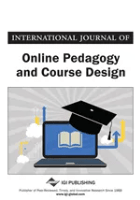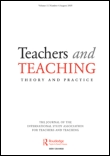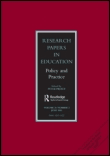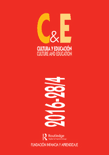
INTERNATIONAL JOURNAL OF TECHNOLOGY AND DESIGN EDUCATION
Scope & Guideline
Fostering Excellence in Technology-Driven Design Education
Introduction
Aims and Scopes
- Technology Education Pedagogy:
Exploring various pedagogical frameworks and strategies for teaching technology and design, including project-based learning, maker education, and design thinking. - STEM Integration:
Investigating the integration of STEM (Science, Technology, Engineering, and Mathematics) disciplines within technology and design education, emphasizing collaborative and interdisciplinary approaches. - Creative Problem Solving:
Focusing on methods to enhance creativity and problem-solving skills among students, particularly through design-based learning and innovation. - Curriculum Development:
Researching and developing curricula that effectively incorporate technology education, including the use of digital tools and resources to engage students. - Assessment and Evaluation:
Analyzing assessment methods and tools in technology and design education to better evaluate student learning outcomes and pedagogical effectiveness. - Inclusivity and Gender Issues:
Addressing gender disparities and promoting inclusivity in technology and design education, particularly in STEM fields. - Ethics and Social Responsibility:
Integrating concepts of ethics and social responsibility into technology and design curricula, preparing students to consider the broader implications of their work.
Trending and Emerging
- Digital Learning Environments:
There is a significant increase in research on digital learning environments, including online and hybrid learning models, particularly in the wake of the COVID-19 pandemic. - Interdisciplinary Collaborations:
Emerging themes emphasize the importance of interdisciplinary collaborations, particularly between technology, design, and other fields such as the arts and sciences, fostering holistic educational experiences. - Maker Education and Hands-On Learning:
A growing focus on maker education highlights the importance of hands-on, experiential learning approaches that engage students in the design and creation of tangible products. - Ethical Considerations in Design:
An increasing number of studies are exploring the ethical implications of technology and design, preparing students to consider the societal impacts of their work. - Sustainability in Design Education:
Research on sustainability practices in technology and design education is gaining traction, reflecting a broader societal concern for environmental responsibility and sustainable innovation. - Artificial Intelligence and Emerging Technologies:
There is a notable trend towards integrating discussions of artificial intelligence and other emerging technologies into technology and design curricula, preparing students for future challenges.
Declining or Waning
- Traditional Teaching Methods:
There is a noticeable decrease in research focusing solely on traditional teaching methods in technology education, as educators increasingly adopt innovative, hands-on, and technology-enhanced pedagogies. - Basic Technical Skills:
Research centered on basic technical skills without the context of design thinking or real-world application is becoming less frequent, suggesting a shift towards more integrated approaches that emphasize critical thinking and creativity. - Static Curriculum Models:
Studies focusing on static or prescriptive curriculum models are declining, with a growing preference for dynamic, adaptable curricula that respond to technological advancements and student needs. - Gender-Focused Studies:
While gender issues remain relevant, there is a waning focus on gender-specific studies in technology education, possibly indicating a broader movement towards inclusivity beyond gender binaries.
Similar Journals

International Journal of Online Pedagogy and Course Design
Fostering collaboration in online learning.The International Journal of Online Pedagogy and Course Design, published by IGI Global, serves as a vital resource for researchers, educators, and practitioners interested in the integration of technology in education. Since its inception in 2017, this journal has focused on the latest advancements in online teaching methodologies, course design, and assessment frameworks, contributing to the dynamic field of educational technology. It is indexed in Scopus and currently ranks Q4 in the Education category, reflecting its growing influence within the academic community. The journal provides an invaluable platform for sharing innovative research and practical insights that enhance online learning experiences, crucial in today’s digitally-driven educational landscape. With an ISSN of 2155-6873 and E-ISSN of 2155-6881, the journal is dedicated to fostering a collaborative environment where ideas and practices in online pedagogy can thrive.

Teachers and Teaching
Shaping the Future of Education Through ResearchTeachers and Teaching is a premier scholarly journal published by Routledge Journals, Taylor & Francis Ltd, providing an essential platform for researchers, educators, and practitioners in the fields of Education and Arts and Humanities. With an editorial focus on the dynamics of teaching and learning, the journal aims to share innovative research and insightful discussions that enhance pedagogical practices and policy development. Notably, it has achieved a Q1 ranking in both the Arts and Humanities and Education categories, signifying its impact and relevance in educational research, as reflected in its Scopus rankings, with an 84th percentile for Arts and Humanities and a 76th percentile in Education. Although it does not offer open access, the journal provides extensive access options for libraries and institutions, making its rich content available to a wide audience. Spanning from 1995 to 2024, Teachers and Teaching continues to set the standard for high-quality scholarship in the evolving landscape of education, inviting contributions that explore challenges and innovations in teaching methodologies.

Informatics in Education
Championing Open Access to Transformative Educational ResearchInformatics in Education is a premier academic journal published by Vilnius University, Institute of Mathematics and Informatics, focusing on the intersection of information technology and pedagogical innovation. With an ISSN of 1648-5831 and an E-ISSN of 2335-8971, this Open Access journal has been disseminating critical research since 2003, enabling widespread accessibility and collaboration across the global educational community. The journal's commitment to advancing the field is demonstrated by its impressive 2023 Category Quartiles: Q1 in Communication and Education and Q2 in Computer Science Applications, highlighting its significant impact on these disciplines. Located in Lithuania, Informatics in Education ranks impressively in Scopus, with a Social Sciences Communication rank of #54/511 (89th percentile) and a Social Sciences Education rank of #188/1543 (87th percentile). The journal's goals include fostering research that informs pedagogical practices and enhances educational outcomes through the innovative use of technology, ensuring it remains at the forefront of research in this vital field. Researchers, professionals, and students alike will find a wealth of knowledge within its pages to support their work and learning endeavors.

Journal of Information Technology Education-Innovations in Practice
Empowering Educators with Cutting-Edge ResearchThe Journal of Information Technology Education-Innovations in Practice (ISSN: 2165-3151; E-ISSN: 2165-316X), published by the Informing Science Institute, serves as a vital resource for researchers and practitioners in the intersection of information technology and education. With a focus on innovative practices and pedagogical advancements, this journal aims to disseminate high-quality research that enhances teaching methodologies and learning experiences in the digital age. Having demonstrated its relevance within the academic community, it proudly holds a Q3 category ranking in both Computer Science and Education fields as of 2023, alongside commendable Scopus rankings, namely #812 out of 1543 in Social Sciences Education and #92 out of 133 in Computer Science (miscellaneous). As a platform that actively promotes open access knowledge, the journal encourages boundary-pushing inquiries while catering to the evolving needs of educators and technology specialists alike. With its convergence period spanning from 2015 to 2024, the journal is poised to play a significant role in shaping the future of IT education.

International Journal of Education and Information Technologies
Advancing Pedagogy with Cutting-edge Information SolutionsWelcome to the International Journal of Education and Information Technologies, a leading academic platform published by NORTH ATLANTIC UNIV UNION-NAUN. With an emphasis on the integration of education and information technology, this journal aims to foster innovative research and discussions that enhance pedagogical practices and technological advancements in educational contexts. Although currently an open access journal, it provides unrestricted access to emerging studies that are crucial for educators, researchers, and professionals aiming to stay at the forefront of education technology. While specific metrics such as H-index and Scopus ranks are yet to be defined, its ISSN 2074-1316 signifies its credibility and commitment to quality scholarship. This journal serves as a vital resource for those passionate about bridging the gap between technology and education, encouraging impactful research that shapes the future of learning environments.

Innoeduca-International Journal of Technology and Educational Innovation
Leading the Charge in Technology-Enhanced EducationInnoeduca - International Journal of Technology and Educational Innovation, published by the esteemed Universidad de Málaga, stands at the forefront of the rapidly evolving intersection of technology and education. With an E-ISSN of 2444-2925, this open-access journal has proudly disseminated cutting-edge research and innovative practices in educational technology since 2015. It aims to empower researchers, educators, and policymakers by providing a platform for sharing knowledge, insights, and advancements that enhance the learning experience through technology. The journal covers a wide array of topics, including digital learning environments, instructional design, and the impact of emerging technologies on education. By offering free access to its articles, Innoeduca fosters a global dialogue among professionals and students alike, making a significant contribution to the field of education innovation and technology.

Journal of Baltic Science Education
Exploring New Frontiers in Science Teaching MethodologiesThe Journal of Baltic Science Education, with ISSN 1648-3898, is a leading academic journal published by the SCI METHODICAL CENTRE - SCI EDUCOLOGICA in Lithuania. This esteemed journal, established in 2008, has gained recognition within the educational sector, boasting a notable impact factor that places it in the Q2 category for the year 2023, highlighting its significance in advancing educational research. With Scopus rankings reflecting a commendable placement at #659 out of 1543 in the Education category, the journal serves as a vital platform for disseminating knowledge and fostering discourse among researchers, professionals, and students in the field of science education across the Baltic region and beyond. The journal’s objectives include promoting innovative educational practices, sharing empirical research findings, and contributing to the development of effective science teaching methodologies, ensuring that it remains at the forefront of academic inquiry in education.

International Journal of Mathematical Education in Science and Technology
Empowering Educators Through Cutting-Edge ResearchThe International Journal of Mathematical Education in Science and Technology, published by TAYLOR & FRANCIS LTD, is a leading academic journal dedicated to the interdisciplinary field of mathematical education, emphasizing the integration of science and technology. With an ISSN of 0020-739X and E-ISSN 1464-5211, the journal serves as a vital resource for researchers, educators, and practitioners seeking innovative methodologies and pedagogical frameworks in mathematics education. As of 2023, it has achieved a prestigious standing in Q2 quartiles across three categories: Applied Mathematics, Education, and Mathematics (miscellaneous), with notable rankings in Scopus, including 16th in Mathematics and 486th in Social Sciences Education. The journal, which has been converging its research and findings since 1970 and will continue to do so until 2024, is not available as an open access publication, but offers a wealth of insights for those committed to enhancing mathematical understanding in various educational contexts. Its emphasis on cutting-edge research makes it a crucial conduit for advancements in both theoretical and practical aspects of mathematics education.

Research Papers in Education
Catalyzing innovation in educational practices and policies.Research Papers in Education is a leading academic journal dedicated to advancing the field of education through the dissemination of high-quality research. Published by ROUTLEDGE JOURNALS, TAYLOR & FRANCIS LTD, this journal, with an ISSN of 0267-1522 and E-ISSN 1470-1146, has been pivotal in shaping educational discourse since its inception in 1986. The journal is recognized in the Q1 quartile for Education in the 2023 rankings and boasts an impressive 91st percentile in Scopus rankings. While it operates under a traditional subscription model, its reach is enhanced by its commitment to scholarly rigor, making it an indispensable resource for researchers, professionals, and students alike. Covering a diverse range of topics including pedagogical strategies, policy analysis, and educational technology, Research Papers in Education facilitates critical dialogue and innovation in the educational landscape, contributing significantly to the ongoing conversation around effective teaching and learning practices.

Culture and Education
Advancing Knowledge at the Crossroads of Culture and EducationCulture and Education is an esteemed journal published by SAGE Publications Inc, focusing on the interdisciplinary nexus between cultural studies and education. With an impactful presence in the academic community, the journal holds significant rankings, placing in the Q1 category for Cultural Studies and Q3 for Education as of 2023. This positions it within the top 14% of journals in Cultural Studies, and it ranks 174 out of 1304 in its category according to Scopus. The journal serves as a vital platform for researchers, professionals, and students dedicated to exploring how cultural dynamics shape educational experiences and policies. Its publications not only contribute to theoretical discussions but also inform practice and policy-making within educational settings. Although it operates under a traditional access model, the journal's commitment to sharing valuable insights into contemporary cultural and educational issues underscores its importance in fostering scholarly discourse. For those engaged in the evolving fields of cultural studies and education, Culture and Education is essential reading, reflecting the latest research and trends from 2008 to 2024.